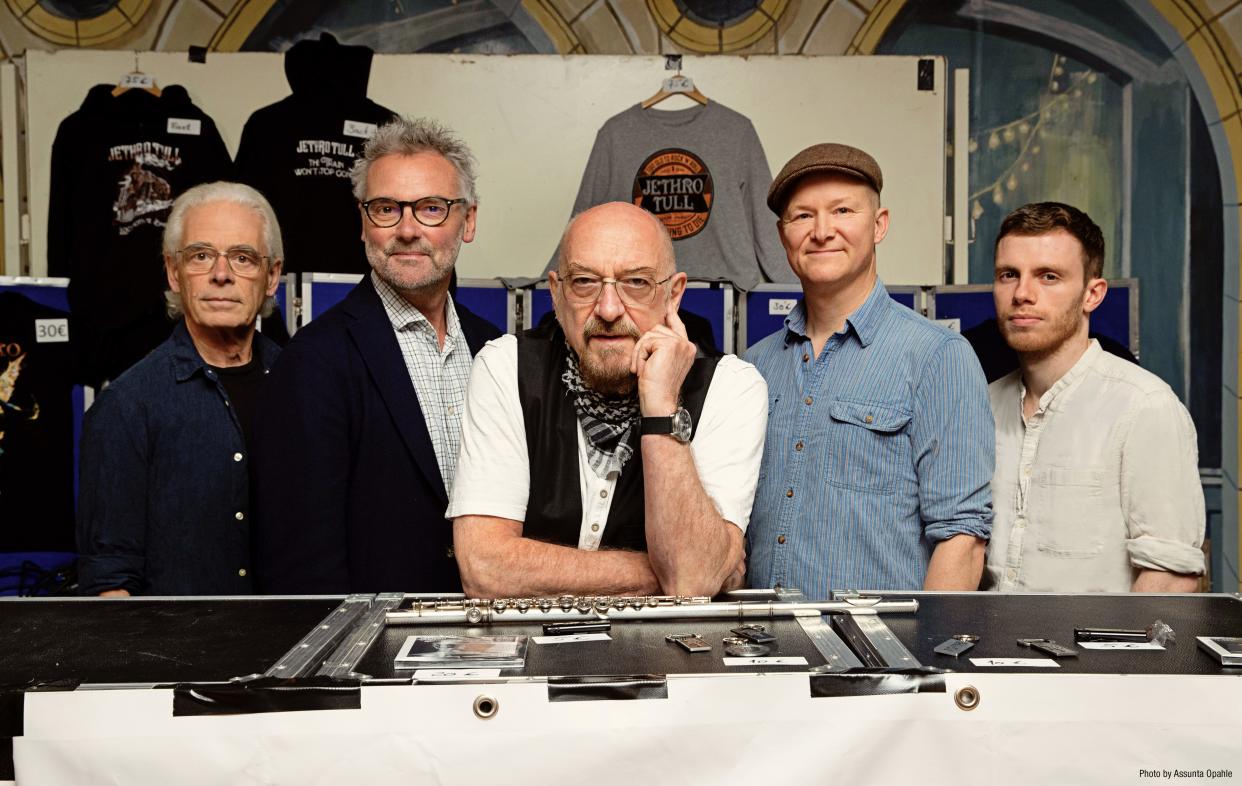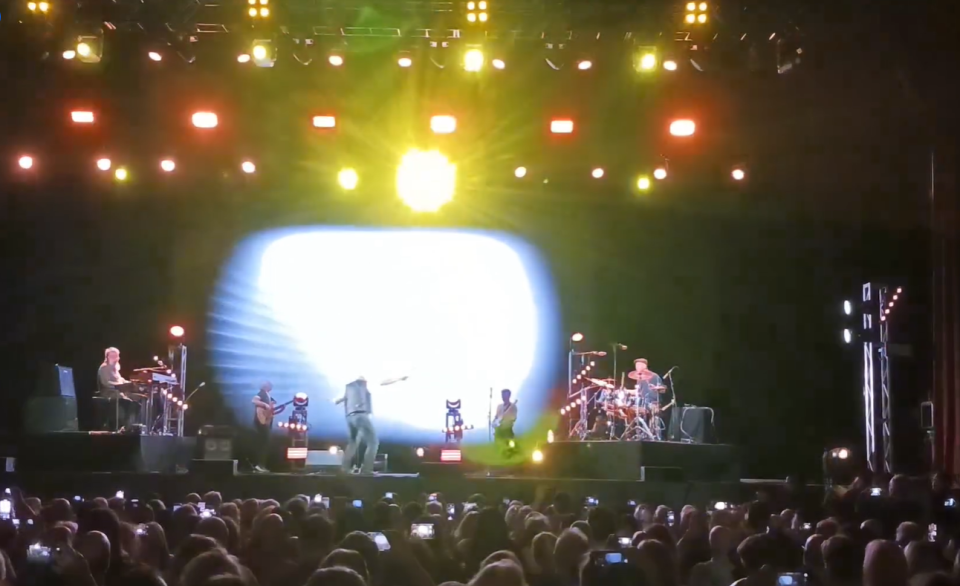Jethro Tull brings power, energy of 'decades' to Boston concert

- Oops!Something went wrong.Please try again later.
The full moon rose over Fenway on a Saturday night of Halloween festivities and gaudy neon lights — the perfect setting for a band whose songs have always reflected theatrics, time travel and wry and sometimes dark observations of human behavior.
For all that, British rock band Jethro Tull, performing Saturday at Boston's MGM Music Hall, created a kind of sanctuary, with front man and sole original member Ian Anderson as host, conductor and an actor portraying myriad characters in story and song.
He's known for making flutes and other woodwinds into a conduit of rock music to rival any electric guitar. But he's also the consummate ensemble player and storyteller, all on view with elegance, grace and sharp wit.
As a stop on the band's "Seven Decades" tour, the show drew from memory — "living in the past," as it were — and apprehensive forecasts for the future, and metaphysical meditations. Throughout, a back screen projected images both enticing and disorienting as the band opened with a perennial fan favorite, "Nothing is Easy."
Anderson, with his dance-like movements and gestures, is perhaps less the fervent, slightly feral central figure of earlier years, but remains a core of power. As the band prepared to play, "Used to Know," from the 1969 album, "Stand Up," Anderson did not let the opportunity pass to observe how much the guitar progression resembles that of a song that came later, the Eagles' "Hotel California."

A lifelong cat lover, Anderson dedicated "Hunt by Numbers," from 1999's "J-Tull Dot Com," to his feline familiars, noting their propensity to cuddle with their favorite humans before presenting them with gifts of eviscerated prey.
Similarly, the band sent out "The Navigators," from their newest album, "RökFlöte," with an homage to all those who guide vessels through treacherous waters, from modern-day commercial vessels, to the terrifying long boats of Vikings.
More: Max Reger Festival 150 in Worcester celebrates German composer and pianist
More: With 'Lodestone,' Singer Mali explores existential fear, love of world's beauty
"RökFlöte" is Jethro Tull's 23rd studio release, and, as part of the band's catalogue of more than 50 years, the pieces included in the concert flowed with the rest of the set in seamless liquidity.
There was a touch of self-deprecation, as Anderson recalled the band's performance of Bach's "Bouree." "I mutilated it back in 1969," said Anderson. "And I'll mutilate it again," as only Jethro Tull can convey it, that threading of folk and classical music, a sound both familiar and elusive.
But now as ever, it was the title song from the band's best-selling album to date, "Aqualung," that drew the deepest and strongest reaction. Its most recent arrangement builds tension with an intricate, orchestral prelude, accompanied on the screen by the sight of an empty park bench, an allusion to the lyrics' first line.
A video portrayed a montage of homeless men and women, their faces both haunted and haunting, overlaid with scenes of crowds in stylish footwear, moving indifferently past, and the album cover art depicting Aqualung, both menacing and heartbreaking.
All taken together, it conveyed, without didact, of a stark reality. "Aqualung" not only persists as he did in 1971, the album's release year. His fate remains as an increasing and frightening possibility, without bounds of race, gender, age, sexual orientation or geography. I have seen him in Cairo, Istanbul, Dublin, London, Boston and blocks from my house.
For me, the song called to mind two people my husband and I recently befriended, one a man, the other a woman, unhoused, with different stories to tell, but both with a goal of striving toward something better. We would buy them coffee and sandwiches and hang out and chat including Christmas Day.
More: Halloween is Irish, American, ancient and modern, but never grows old
We haven't seen either one in a while. We can only hope our small kindnesses helped them on their rough path, like the narrator's plea: "Aqualung, my friend, don't you start away uneasy."
The finale also brought the band's enduring energy, with "Locomotive Breath," also from the "Aqualung" album, the hard-driving anthem of a beleaguered everyman, betrayed even by his closest friends and family. Audience members leapt with a sea of beaming lights from cellphones, anxious to share the one piece from the show in which recording was sanctioned.
The concert began with a prerecorded announcement by Anderson, politely asking audience members to refrain from using cellphones and cameras until the show's encore. And for the most part, they complied, except the couple sitting two seats over, who appeared too engrossed in online shopping to notice.
A comical interlude reminiscent of a "Saturday Night Live" sketch occurred when one audience member stood, dancing and waving her arms enthusiastically, shouting, "I love you, Ian Anderson!" even while most people remained in their seats.
For some, getting to the concert was a pilgrimage, through winding streets, flashing nightclub signs, scores of costumed revelers and perhaps the occasional, real-life werewolf. Approaching the entrance, one concert goer in the queue said to a companion: "Let's see who sets off the metal detector, your knee or mine."
It was a humorous moment and a poignant one that might well have come from a Jethro Tull song, an early one, looking with wonder and apprehension into the future, on a train that wouldn't slow down.
This article originally appeared on Worcester Magazine: Jethro Tull brings 'decades' of power, wonder to Boston concer

